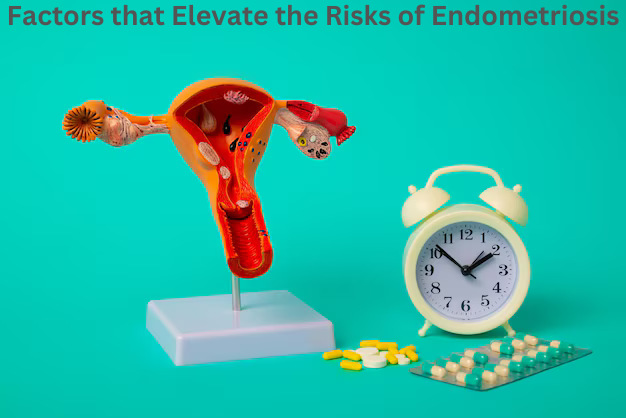Factors that Elevate the Risks of Endometriosis
Endometriosis is a chronic, often painful condition where tissue similar to the uterine lining grows outside the uterus. This can lead to inflammation, scarring, and other health issues, including fertility challenges. Understanding the risk factors for endometriosis can help you stay proactive about your reproductive health. At New World Fertility Centre in Delhi, we aim to provide you with insights and support for managing and treating conditions like endometriosis.
Familial Predisposition
A family history of endometriosis significantly increases the risk. This suggests a potential genetic component, although specific genes have yet to be definitively identified.
Menstrual Cycle Characteristics
Early Menarche: Menstruation onset before the age of 11 correlates with an increased risk of endometriosis.
Short Menstrual Cycles: Cycles shorter than 27 days expose the body to more menstrual cycles over time, potentially elevating the risk.
Heavy Menstrual Flow (Menorrhagia): Excessive menstrual bleeding may also be a contributing factor.
Reproductive History
Nulliparity: Women who have never given birth appear to have a slightly higher risk.
Delayed Menopause: Later onset of menopause can increase the risk.
Other Potential Factors
Immune System Disorders: Certain autoimmune conditions, such as lupus or thyroid disorders, may be associated with an increased risk.
Environmental Factors: Research suggests that exposure to specific chemicals or pollutants may play a role.
Lifestyle Considerations for Risk Reduction
While there's no definitive way to prevent endometriosis, adopting certain lifestyle practices may mitigate the risk:
Weight Management: Maintaining a healthy weight can help regulate hormone levels.
Regular Physical Activity: Exercise can help regulate hormones and reduce inflammation.
Balanced Diet: A diet rich in fruits, vegetables, and whole grains can support overall health.
When to Seek Medical Attention
If you experience any of the following symptoms, it's crucial to consult a healthcare professional:
- Pelvic pain, especially during or before menstruation
- Pain during or after sexual intercourse
- Pain during bowel movements or urination, particularly during menstruation
- Heavy or painful menstrual bleeding
- Infertility
Early diagnosis and treatment are essential for managing symptoms and optimizing fertility outcomes. If you have concerns about your risk of endometriosis, consult your doctor for a comprehensive assessment and appropriate recommendations.
Frequently Asked Questions (FAQs)
1. What is endometriosis?
Endometriosis is a condition where tissue similar to the uterine lining grows outside the uterus, often causing pain, inflammation, and, in some cases, fertility issues.
2. What are the symptoms of endometriosis?
Common symptoms include severe menstrual cramps, chronic pelvic pain, pain during intercourse, heavy or irregular periods, and sometimes infertility. Some women may also experience gastrointestinal discomfort and fatigue.
3. Is endometriosis genetic?
Yes, genetics play a role. If close family members, like a mother or sister, have endometriosis, you may be at a higher risk of developing it.
4. How does early menstruation increase the risk of endometriosis?
Early menstruation increases lifetime exposure to estrogen, which may stimulate the growth of endometrial-like tissue outside the uterus, heightening the risk of endometriosis.
5. Can lifestyle choices affect my risk of endometriosis?
Yes, factors such as high alcohol or caffeine intake, low body mass index (BMI), and exposure to environmental toxins can influence estrogen levels and increase the risk of developing endometriosis.

 Jul-16-2025
Jul-16-2025